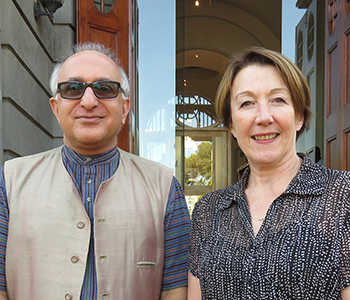Latest News Archive
Please select Category, Year, and then Month to display items
10 March 2022
|
Story Anthony Mthembu
|
Photo Unsplash
 The No Student Hungry team gearing up to start distributing food parcels to the selected students.
The No Student Hungry team gearing up to start distributing food parcels to the selected students.
The UFS is one of the many institutions of higher learning where food insecurity is an active issue. However, the
No Student Hungry Programme is one of the initiatives launched at the university to assist in fighting food insecurity at the institution.
The purpose of the programme
Since its inception in 2011, the initiative has assisted many students in acquiring a healthy meal. Additionally, the Food Environment Office also hands out food packages, so that students can continue to achieve academically. “We are trying to develop a healthy environment for students and make it easier for them to have a nice and healthy meal,” stated Annelize Visagie, who heads the Food Environment Office at the UFS. The Food Environment programme is spread out on all three campuses, each with its own facilitators. Furthermore, the programme mainly caters for students who are not funded by the National Student Financial Aid Scheme (NSFAS) but who are excelling academically. The abovementioned students apply for assistance online, and a list is then drawn up of students who receive assistance for the year.
Alternative solutions to keep the initiative running
On the Bloemfontein Campus, the No Student Hungry Programme will be catering for 200 students in the 2022 academic year, assisting them with a daily nutritious meal. Additional food parcels are also handed out to provide further assistance. “We give food parcels to the students on the list every Tuesday and Thursday at the Thakaneng Bridge,” Visagie highlighted. However, she argues that catering for the student population through this programme can be a challenge, as the demand for assistance is growing rapidly and the ability to assist is limited. The programme relies on partnerships and sponsors to assist the student body. In fact, the coordinators of the programme currently have a memorandum of understanding with Tiger Brands according to which they deliver around 100 food parcels for distribution.
In addition, the coordinators have put in place alternative measures to ensure that they can provide more food to students. “The
Kovsie Act Office, in partnership with the
Department of Sustainable Food Systems and Development, has started a food garden where healthy and nutritious produce are grown, in order to add value to the distribution,” she indicated. Although the programme can only assist to a point, students who are in desperate need of assistance are never turned away. In fact, the
Social Support Unit at Thakaneng Bridge usually assists students with food vouchers for a maximum of four days.
A commitment to teaching healthy eating habits
The programme is not only committed to curbing food insecurity, but also to ensuring that students have a healthy and balanced diet. As such, a booklet is being issued by the
Department of Nutrition and Dietetics in collaboration with the Department of Sustainable Food Systems and Development, which contains ways in which students can make a healthy meal using some of the ingredients offered in the food parcels.
“We want to teach students how to eat healthy in the cheapest way, because they don’t have a lot of money to buy expensive food products,” Visagie argued.
Andrew Mellon Foundation renews ongoing support for UFS projects
2017-04-10
 Dr Saleem Badat and Annemia van der Heever.
Dr Saleem Badat and Annemia van der Heever.The University of the Free State (UFS) was first awarded a grant by the Andrew W Mellon Foundation (AWMF) in 2015 to fund several projects between 2015 and 2016 under the International Higher Education Strategic projects fund. The programme’s director, Dr Saleem Badat, visited the UFS on 23 March 2017 as part of his annual first-quarter feedback sessions, with not only the UFS but other universities around the country that benefited from the programme. Top of the agenda was a meeting with principal investigators of projects funded by the foundation, to discuss the UFS’s institutional priorities for funding, alongside the university’s management, to discuss possible intra-institutional projects to be undertaken with other universities.
During his visit, Dr Badat met with Prof Nicky Morgan, UFS Acting Vice-Chancellor and Rector, as well as the AWMF representative, Annamia van der Heever, Director: Institutional Advancement. He discussed future plans with managers of the Programme for Innovation in the Artform Development, #Movements project, Inclusive Professoriate Grant and the Curriculum reform programme which involved seven other universities.
The AWMF, through its projects, is instrumental in developing and maintaining strong higher education institutions that produce knowledge and high-quality graduates, and advances social justice. The projects further aim to deepen and broaden public understanding and support for the arts and humanities, diversity and inclusion. “The Foundation each year presents universities with wonderful opportunities to improve teaching, learning and research in the humanities. We are working hard with the Faculty of Humanities on possible submissions for 2017,” said Van der Heever.
During 2017 between $10.8 million and $12 million will be available for grants by the Foundation’s International Higher Education and Strategic Projects programme. The Vice-Chancellor’s Office will continue to serve as a contact point and administrative support for UFS projects currently funded by AWMF. Institutional Advancement will assist project leaders to draft submissions to the Foundation this year and in the future. In 2018 AWMF will celebrate 30 years of involvement in supporting higher education in South Africa.